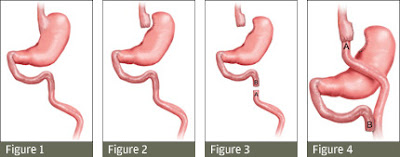Imagine finding yourself 150# OVER weight. Your desired weight is 150# and you weigh 300#. You’ve tried everything throughout the years to lose weight, and to no avail. Diet after diet fails and you ultimately gain even more weight after the diet du jour ends.
You run into an acquaintance you haven’t seen after a year and are stunned to see that she has lost close to 100#. What? You find out that she has had gastric bypass surgery. She looks and feels great. You are mesmerized. If she can “do it”…you can “do it, too.”
 You find that there are two main types of obesity surgery: Gastric banding and Gastric bypass. You want to have one of the procedures done, but you want to know which will be most effective. This is what researchers from Bristol University are seeking to pinpoint and are beginning a research study involving 700 participants.
You find that there are two main types of obesity surgery: Gastric banding and Gastric bypass. You want to have one of the procedures done, but you want to know which will be most effective. This is what researchers from Bristol University are seeking to pinpoint and are beginning a research study involving 700 participants.
Read on to discover some very interesting “insider” information on obesity surgery…and then vote with your conclusions!
Which type of obesity surgery is best? If the study organizers are really interested in assessing the results of the surgeries, I truly believe they have the time line set one year too soon.
I have worked with gastric bypass/banding patients on a one-on-one basis for over 15 years. I counsel them before and after the procedure. I have kept data on thousands of patients. I can conclude that the outcome line should be set at the end of year 4 post surgery. Why? By the end of the 4th year, more than 50% of patients will experience weight regain...and some have regained all their lost weight, are back on all their previous medications, and return to the exact health picture the surgery was supposed to eliminate.
Lap band surgery
An inflatable silicone band is placed around the top portion of the stomach minimizing stomach capacity to 1/2 cup. ( A normal stomach can hold 6-8 cups. Banding does not rewire the GI tract. Stomach acid is still present in the bottom portion of the stomach. The band is supposed to minimize over-eating. If the patient eats one bite over the "cap", he will vomit up the contents of the pouch...and in this motion, acid will also pass through the pouch and into the esophagus. The band causes a feeling of extreme fullness after eating just 1/2 cup of food (think of the feeling after Thanksgiving dinner). One more bite and....out it comes. The surgeons I worked with called this procedure "extreme behavioral modification."
As with many things, sometimes behavioral modification causes new behaviors to surface. Patients quickly realize that liquid and semi solid/soft foods pass right through the band and can be consumed comfortably without vomiting. You get the picture. Also...many small meals through the day and night (ultra grazing) can add up to LOTS of calories/day.
In the end: success depends on following a diet and exercising WITH the band. Success is not all that great by the end of year 4 and most patients return to their previous weight or have had the band removed. (If you have GERD, no banding for you as the problem will worsen.)
GASTRIC BYPASS
GASTRIC BYPASS is a much different story, although if the researchers wait until after the 4th year post op, they will note that MANY patients who took this very significant leap have regained or are on their way to regaining their weight, medications have returned, and health issues are coming back into play.
With bypass we have the surgical trifecta:
Part one: The stomach is stapled in 2 parts. The top pouch is left at about 2 ounces in capacity (after 1 year will expand to about 1 cup) and the stomach acid remains in the bottom part. This might sound like a benefit as it can no longer reach the espophagus and cause inflammation/irritation, but it also can't help digest foods.
Part two: the small intestine's duodenum and first part of the jejunum are bypassed. These are vital areas of digestion and absorption for many essential vitamins/minerals and ....calories. So, in bypassing this part of the intestine, the person will never absorb nutrition to its fullest. If vitamins/minerals are not religiously taken, serious vitamin/mineral deficiencies will occur.
Part three: the intestine that is left is reattached to the bottom of the 2 ounce pouch. Food passes from the stomach pouch (without the pre-digestion from acid) into a lower portion of the intestine (without begin broken down by many enzymes and with nutrition still intact...never to be absorbed).
I'm sure you can see how MAJOR this "permanent" surgery is.
 |
| Carnie Wilson before gastric bypass, after gastric bypass, and now |
I'm sure it's obvious that in terms of weight loss, the gastric bypass is going to come out "on top" in comparing gastric banding vs gastric bypass. The band is just a band around the stomach making it difficult to eat over 1/2 cup without vomiting. The bypass involves a total rewiring of the GI tract PLUS minimizes the amount of food that can be ingested.
What I was shocked to find was that even after the gastric bypass, after the 4th years, more than half the patients were well on their way to regaining weight or had already regained their lost weight. Remember, they are "rewired". How and why does this happen?
My belief is that after the stomach pouch stretches to its new maximum (at about the one year mark post surgery), it can accommodate enough carbohydrate to stimulate the pancreas to return to over-releasing the fat gain hormone insulin. MANY patients who become morbidly obese have underlying insulin imbalance. When their pouch is at the 2 ounce mark, and they are encouraged to eat mostly protein and veggies, they do not suffer from over insulin release. After about a year, there is enough room in the stomach to accommodate protein AND significant portions of carb foods and therein lies the problem. It becomes possible to eat bread, pasta, potatoes, cereals, snack crackers...and in fact...it's comfortable once again
I feel very sorry for patients who undergo gastric bypass surgery and all it entails, who watch themselves lose over 100 pounds, get off many medications, look and feel great...only to watch while the pounds creep back on....for what seems to be "no reason".
Ultimately, I have to tell these patients that they will need to once again "diet." The diet will be the core program from the Metabolism Miracle or Diabetes Miracle. I now tell patients contemplating gastric bypass that they might consider opting for living the Metabolism Miracle lifestyle before having surgery. Several patients lost significant weight and did not opt to have the surgery. They are now at their desired weight. In either case…whether they have the surgery or not…over 50% will need to live the core program from Metabolism Miracle to maintain weight loss. Surgeons are NOT telling their patients this!
I would love to get the word out to these patients that if they have metabolism B, gastric bypass surgery will help them lose a large amount of weight in a short period of time and get off many medications. They will look and feel great. But one year after the surgery, they will need to begin following The Metabolism Miracle program and make this their lifestyle. In this way, they will get where they need to be...and stay there.
What I was shocked to find was that even after the gastric bypass, after the 4th years, more than half the patients were well on their way to regaining weight or had already regained their lost weight. Remember, they are "rewired". How and why does this happen?
My belief is that after the stomach pouch stretches to its new maximum (at about the one year mark post surgery), it can accommodate enough carbohydrate to stimulate the pancreas to return to over-releasing the fat gain hormone insulin. MANY patients who become morbidly obese have underlying insulin imbalance. When their pouch is at the 2 ounce mark, and they are encouraged to eat mostly protein and veggies, they do not suffer from over insulin release. After about a year, there is enough room in the stomach to accommodate protein AND significant portions of carb foods and therein lies the problem. It becomes possible to eat bread, pasta, potatoes, cereals, snack crackers...and in fact...it's comfortable once again
I feel very sorry for patients who undergo gastric bypass surgery and all it entails, who watch themselves lose over 100 pounds, get off many medications, look and feel great...only to watch while the pounds creep back on....for what seems to be "no reason".
Ultimately, I have to tell these patients that they will need to once again "diet." The diet will be the core program from the Metabolism Miracle or Diabetes Miracle. I now tell patients contemplating gastric bypass that they might consider opting for living the Metabolism Miracle lifestyle before having surgery. Several patients lost significant weight and did not opt to have the surgery. They are now at their desired weight. In either case…whether they have the surgery or not…over 50% will need to live the core program from Metabolism Miracle to maintain weight loss. Surgeons are NOT telling their patients this!
I would love to get the word out to these patients that if they have metabolism B, gastric bypass surgery will help them lose a large amount of weight in a short period of time and get off many medications. They will look and feel great. But one year after the surgery, they will need to begin following The Metabolism Miracle program and make this their lifestyle. In this way, they will get where they need to be...and stay there.
What I have seen happen is that because they were never fore-warned, they are blamed for regaining weight. The surgeon states he/she “has no idea why they are regaining” as the surgery was done correctly. The patient is back to feeling like a failure, when he was really not informed.
I hope this article INFORMS and helps those who have had the procedure and are now regaining to understand why and to realize that there is a way to stop the gain.
"Blow the Whistle" Please answer the Whistle Question!










